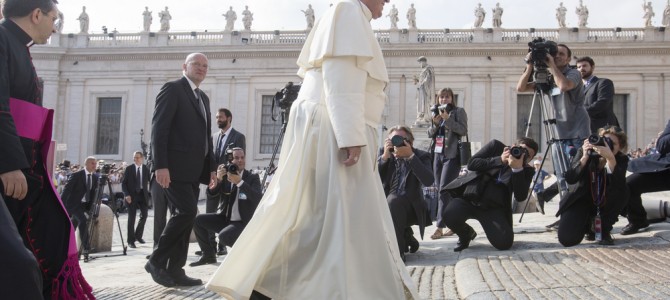
Pope Francis has released his much-anticipated encyclical on the environment and “care for our common home” (it is not just about climate change). Things are going about as well as politically conservative Catholics expected.
A distressing amount of media commentary on the document is, at best, only partially acquainted with Catholicism’s particulars. No, encyclicals are not automatically binding on the faithful (unless they deal with faith and morals). No, Jeb Bush is not a cafeteria Catholic for disagreeing with the pope on this issue. No, fossil-fuel policy and recycling do not have the same moral weight as abortion, marriage, and contraception.
More irritating than the ignorant are the agenda-driven, who know enough about Catholicism to pick at the threads of truth running through the encyclical (and there is a lot of truth in it) and try to unravel it. Certain national Catholic reporters have, shall we say, a creative interpretation of “fidelity” and are not above seizing on Il Papa’s every utterance to signal the tidal shift they’ve been expecting since the 1960s. They write their analysis with an eye towards fundamentally altering the church they claim to love so much, and can’t really be trusted.
Taken together, this means the vast majority of Catholics (and non-Catholics) will receive an interpretation of ‘Laudato Si’ that hovers somewhere between drunken rambling and wishcasting heresy.
Package the Release Better Next Time
As is typical for the Vatican, there has been a total failure to control its message. A copy leaked early, and that set tongues wagging. Giving the above-mentioned interpreters extra time to formulate their thoughts rarely improves the outcome. Not for the first time, I wish the church would just hire one of those evil public-relations firms to manage these rollouts (and, while they’re at it, update their website).
All that is before getting into the actual message of the document, which at 35,000-plus words of popespeak is a daunting task. The Federalist’s own Rob Tracinski had a pretty good cut at it, pointing out a few of the ways His Holiness seems to be entirely closed off to interpretations of scientific data and economic history that don’t comport with the prevailing leftist dogma.
One thing that jumped out at me in my reading was the pope’s call for dialogue on the issues, “a conversation that includes everyone.” Yet seemingly in the next breath, he characterizes those who have opposed “concrete solutions to the environmental crisis” as “obstructionist.” A fair reading of the section would seem to define an “obstructionist” as anyone who doesn’t accept the premise that climate change is
- a looming catastrophe
- dramatically accelerated by man’s economic, agriculture, and social activity and
- addressable only through punishing regulatory schemes and reordering our patterns of consumption.
What if I don’t believe those things? Am I an obstructionist, or just trying to be prudent?
Encyclicals Aren’t Political
While it contains much that is good, and some truly apt descriptions of the pitfalls of technology (see Chapter 1, section 47), at certain other points this encyclical reads like a series of passionate Facebook posts. The pope urges caution in the use of genetically modified crops, for instance, even while noting the benefits they have brought to the world’s poor, whom he spends much of the document reminding us are unduly effected by environmental and social policy. While rightly speaking against a culture of “practical relativism,” he states that the same “thinking that leads to sexual exploitation of children…is also the mindset of those who say: Let us allow the invisible forces of the market to regulate the economy, and consider their impact on society and nature as collateral damage.”
Perhaps I misunderstand the Holy Father’s point. Does he mean to say that anyone who trusts the billions of individual decisions which constitute “the market” is no better than one who sells children into sex slavery? Or is it only those who also dismiss the “collateral damage” that are, for all intents and purposes, members of ISIS? Was this meant as a challenge, or an insult? I know how I took it.
Questionable formulations aside, here is the essential thing to remember about the Catholic Church and our pope: they do not fit neatly into the American political framework. Team RC is neither Right nor Left. This encyclical makes that very clear. Between his overwrought pronouncements about the dire state of the environment (“Doomsday predictions can no longer be met with irony and disdain,” to which I say, “Try me”) and repeated knocks against capitalism (which has lifted more people out of crushing poverty in a shorter timespan than I think His Holiness would care to admit), Pope Francis issues a challenge.
We must examine the way we care for God’s creation, particularly how our actions might affect our poorest brothers and sisters. There’s nothing wrong with that. He also lays down some hard truths about human dignity and the sanctity of life that will set lefty heads a-spinning if they ever actually read it.
‘Laudato Si,’ despite its flaws, cannot be dismissed as the ravings of a Gaia-worshipping socialist crank. That said, Catholics should not feel compelled to give the policy particulars their uncritical assent, especially if those policies are borne out of dubious science.









